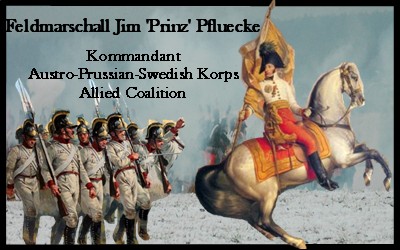|
I am going to have to disagree with Mark and Ed here for a minute. I think that you are both discounting the political aspect of this.
1. As I noted, in some ways I agree with El Presidente, in that if you are going to fight, you should fight to win. But in a state, France, that was a military dictatorship, the Guard was more than an elite reserve on a battlefield, it is the representation of the power of the ruler. Not something to be committed lightly.
So yes, Napoleon should have gone forward to look at the front as the battle reached its climax and, according to the marshalls on the scene, the time was right to send in the reserves. It appears that Napoleon had a set of odds in his heads---roll the dice on a battle, a battle that he had been seeking for weeks--- but, in the end, it was a limited risk he was willing to accept. Likely damage to his guard, or its possible defeat or at least heavy loss, was not, in the end, odds he would attempt to roll.
More prudent would have been to retreat to Smolensk rather than risk a battle that he, in the end, was not wholly committed to winning, although we will never know if, from the start he did not want to commit his guard or if this was more a reaction to the stubborn performance of the Russian infantry and the carnage wrought by their guns.
A final question here is this: Did Napoleon have enough cavalry in reserve to exploit a successful attack by the guard? I am not sure if he did, and certainly, without cavalry to pursue, the Guard breaking the Russian line was no guarantee of a stratgically decisive victory.
2. The distance from home and supply. When the aide supposedly said something to Napoleon about the Guard being the last body of formed troops between Borodino and (I forget where) France, he was on to something. Was this something that had been discussed previously?
This bears also on the idea of a flank march. Dividing your forces in the face of the enemy is always tricky, but it is even trickier when you are weeks away from your nearest base- the price of failure is high. How many times did Napoleon divide his force in the face of the enemy when Napoleon was not sure to have a large superiority in numbers? How many times were his flanking attacks the result of strategic and operational manouvers, as opposed to tactical ones, such as this one would be?
3. There are times when throwing everything in is the best military decision, but not the best political objective. The Austrians showed this in 1814- their strategic, geo-political goals went beyond defeating Napoleon and led to the diversion of troops out of the theater, a de-emphasis on destrying Napoleon's armies, and the need to preserve their own army to negotiate from strength and therefore utilized the German forces under their command as much as possible in 1814 to do the fighting.
For Napoleon, his military decisions made at Borodino had reprocussions throughout his Empire. Preserving the Guard echoed beyond Borodino and, while perhaps costing him a decisive defeat (in doubt due to lack of cavalry), may have played into his calculus of decision making.
A few months back I read the book "A Savage War of Peace," on the Algerian Revolution. There is a qoute in there by DeGaulle explaining to one of his confidants about how the generals did not understand that the needs of France were greater than the needs of the army in Algeria and that there was a balance between needs (defeating the revolution) and ends (the methods used), that played out in the global balance of power. At this time, France was tying to reclaim its position as a great power by attempting to position itself as a global arbitrer between the USA/NATO and the USSR. "Third World" opinion mattered and so, therefore, did the methods used in Algeria. Losing Algeria was more acceptable than alienating world opinion. The qoute is something like "France is more than Algeria," which the generals did not understand or agree with.... but I digress.
_________________ 
|





